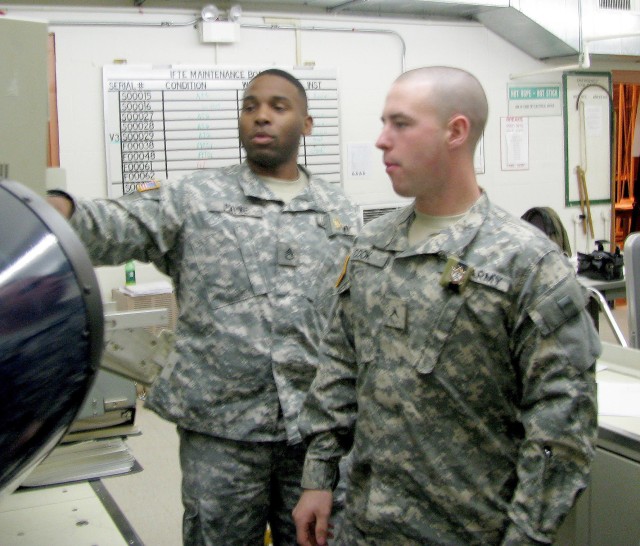REDSTONE ARSENAL, Ala. (Army News Service, March 5, 2008) - Soldiers who may be stuck in their careers because of busy schedules or limited educations can turn to the Basic Skills Education Program to help them boost their test skills and get promoted.
With test scores outside required ranges, a Soldier may find that they can't take their careers in the directions they want to go. The BSEP, which dates to the Korean War, is geared toward Soldiers whose adult basic-education scores are below 10.2 and who have a general-technical score below 110.
"BSEP is a part of the Functional Academics Skills Training program. It supports career and personal goals," said Charles Williams, an education services specialist. "Also FAST supports the Noncommissioned Officer Education System and the Army's goal to retain quality personnel."
Sgt. Chris Payne had set his sights on becoming a warrant officer. However, his GT score wasn't high enough to make that dream a reality.
"It would help me better my career to see things from both the officer side and the enlisted side," Payne said. "I'm ready to move to the next step."
He knew about the BSEP. In fact, he had gone through a version of it at his first duty station in Korea. At the time, however, Payne said he lacked the maturity to really get any true benefit from it.
"I was new to the military and I wasn't thinking about the future," Payne said. "I didn't have the mindset to accomplish the mission."
After eight years, Payne decided to take responsibility for the direction his career was going. He knew that if it wanted to meet his goals, he would have to give the program another try.
"I thought it was time to put more time into studying and preparing myself for the future," he said.
The program is self-paced. The Soldier attends in two-hour increments for a total of about 60 hours, Williams said. It uses a combination of instructor-led and computer-based studies to give each Soldier as much or as little help as they need. At any given time there are usually four Soldiers enrolled in each course, Williams said. Maximum enrollment is eight Soldiers.
"It takes about 30 days of uninterrupted training to complete the course," Williams said. "The student is provided a variety of modules including pencil and paper, and computer aided with assistance from the instructor."
Payne spends his mornings as an instructor for the 94 Yankee integrated-test equipment and his afternoons as a squad leader. Due to his demanding schedule, it took him about six weeks to complete the course. Finding a two-hour block of time wasn't always easy, he said, but instructors at the education center kept him motivated.
"With my teaching I didn't always have the dedicated time," he said. "But their dedication to me made me go forward in what I had to do. They took the time out to help me and I appreciate that. The one-on-one interaction was the best part."
It was a labor that paid off for Payne. After completing the BSEP in December, he saw a 20-point jump in his GT score. Having surpassed the requirement, he is working on the paperwork that accompanies his quest for warrant officer.
If he hadn't raised his score sufficiently, Williams said that Payne could have gone through the program again. While how much improvement a Soldier shows varies by individual, Williams said every Soldier who comes through sees some improvement.
Payne's success in the program has motivated him to continue his civilian education. He plans on using the education center to find a local engineering graduate program. He urges all Soldiers to make good use of the programs available to them, like BSEP.
"Anybody who has a low GT needs to do this," he said. "Everybody (at the education center) is dedicated to teaching Soldiers to be productive and in better shape for their future."
"Soldiers need only to speak with a counselor to take advantage of the training," Williams said. "Commanders and counselors may refer Soldiers to participate in the FAST program. Also, Soldiers may refer themselves to participate in FAST. Counselors evaluate referred Soldiers to see if they require BSEP instruction prior to enrollment in other FAST components."
(Kelley Lane-Sivley writes for the "Redstone Rocket.")


Social Sharing